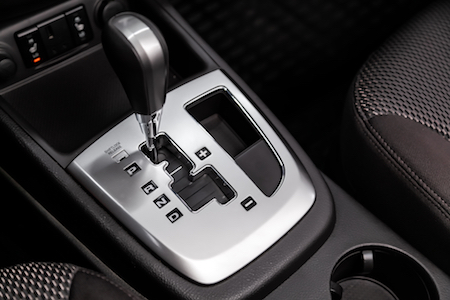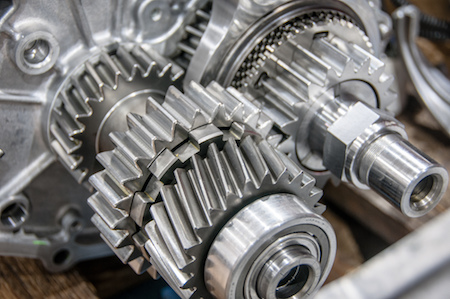There are a few problematic issues with your car that are easy to diagnose. If you forget to put gas in the tank, you’ll recognize the familiar sputter as your car chugs to a stop on the last fumes. You’ll also see the warning sign blinking at you on your dashboard.
Other systems can be more difficult to diagnose. When your car isn’t shifting right, for example, it could be a number of problems. Most likely it’s a sign of a problem with your transmission system.
What happens when your transmission starts to fail
Wouldn’t it be nice if your car sent out warning signs as each piece began to fail? It does.
Let’s say you take your car out for a drive on the weekend. Maybe you head into the hills for a day of skiing, or just a short drive to the park to play a game of softball with a few friends.
Halfway there, your car starts making a whining noise, so you slow down. Or maybe you pick up speed to head up a hill and your car suddenly revs up and bucks.
Then you notice your car doesn’t shift quite right. Maybe it’s more difficult for you to put it into gear. Or maybe you hear a clunk or even a whir as the gears attempt to move as you drive.
What could it be?
If you’re like most drivers today, you head online and do a little research. That’s probably how you got here.
Very quickly, you start to build a picture of what could be wrong. Gears. Transmission. Very expensive … And your mind shifts to a variety of different questions.
- Could it be that my car has a blown transmission?
- How did it happen?
- Was there a way I could have prevented it?
- How much will it cost to repair my transmission?
- Is it worth it? Or is it time to look for another car?
- What are my options?
We’re here to point you in the right direction.
When an automatic transmission is working correctly
Before we get into the warning signs of why your car isn’t shifting right, let’s talk about how the transmission is designed for your vehicle.
Like other systems in your car, the automatic transmission uses a combination of mechanical, electrical, and hydraulics to make the system work.
The mechanical system is designed for functionality. It helps the high engine speed and the slower gear speed synchronize to give you a smooth drive. The electrical system provides sensors to ensure proper gear selection and position. The hydraulic system uses fluid to ensure proper gear positioning. They work together to ensure the automatic transmission flows efficiency every time you get behind the wheel.
What are the signs of transmission failure?
At the first sign of failure, you’ll find your car tries to warn you something is wrong. If you ignore it and the situation worsens, your repair bills rise, until finally, you might have to replace the transmission altogether. You should watch for:
The transmission warning light – luckily, today’s cars have dashboard lights for everything. Don’t ignore them when the little lights pop on. They give you ample time to make your way to a service station.
The car isn’t shifting right – when an automatic transmission transitions smoothly, you don’t pay any attention to how it operates as you speed up and slow down. That changes when it starts to have problems. You’ll notice the movement. You’ll hear it, feel it, sense it.
The gears change position for no reason – when you’re driving at a stable speed, you’ll notice the gear moves for no reason, causing a jolt in your driving patterns. It may slip from a gear to neutral, creating an unusual sound from your engine.
A fluid leak – the hydraulics in your transmission system need hydraulic fluid to operate correctly. This shouldn’t leak. If you notice a puddle of fluid underneath your vehicle, it can be a sign something is wrong with the transmission system. To distinguish it from other fluids your car uses, the transmission fluid is a clear red, sweet smelling liquid, though it may darken if it’s bad.
Delayed gear engagement – you press down on the accelerator and expect to go. Only it doesn’t, not right away. There’s a delay as the gears take extra time to move and connect. There’s a pause, your car lurches forward, bucks as it tries to respond.
What is the cost of fixing a transmission problem?
To fix your transmission, it boils down to parts and labor. That’s difficult to estimate without bringing your car in and having it evaluated.
Yet it’s important to note that for every day you continue to drive your car, ignoring the problem, the damage continues to worsen. What once was a simple fix may now be difficult – and expensive.
It may be as simple as replacing the fluid. Of course, if you wait until eventually, you’re stuck with a blown transmission, the repair bill can quickly add up.
Any indication that your vehicle isn’t shifting correctly should be dealt with quickly to avoid bigger problems.
While simple repairs like changing out the transmission fluid may only need a day in the shop, the act of replacing a transmission will take longer, allowing two full days or more.
Of course, the easiest way to budget your time and your costs for the project is to bring it in for an estimate. Only then can we provide you with all of your options.
Do you think your vehicle might have a problem with its transmission? Have you noticed your car doesn’t shift right, yet you aren’t quite sure what’s wrong?
Trust us to help diagnose the problem, and provide you with the best way to move forward with your car. We look forward to serving you with all of your car needs.

